

No Job Is Safe, But These Skills Will Always Be Valued in the Workplace. From time to time, the Singularity Hub editorial team unearths a gem from the archives and wants to share it all over again.

It's usually a piece that was popular back then and we think is still relevant now. This is one of those articles. It was originally published November 19th, 2015. We hope you enjoy it! Robot doctors, online lawyers and automated architects: the future of the professions? Last year, reporters for the Associated Press attempted to figure out which jobs were being lost to new technology.

They analysed employment data from 20 countries and interviewed experts, software developers and CEOs. They found that almost all the jobs that had disappeared in the past four years were not low-skilled, low-paid roles, but fairly well-paid positions in traditionally middle-class careers. Software was replacing administrators and travel agents, bookkeepers and secretaries, and at alarming rates. Jobs of 2030. Bill Gates: Labor market unprepared for software bots revolution. According to Bill Gates, the robotic revolution is going to change the face of the labor market -- and we will be left grossly underprepared.
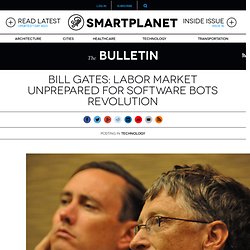
Speaking at the The American Enterprise Institute on Thursday, Gates said that within 20 years, many jobs will be a thing of the past, only to be replaced with software automation. In other words, robots. Cost cutting and supply chain optimization through technology may benefit businesses and the bottom line, but will likely leave many employees short of work. Technology and jobs: Coming to an office near you. INNOVATION, the elixir of progress, has always cost people their jobs.
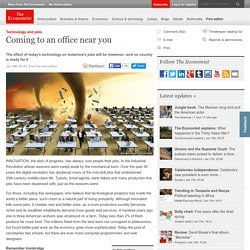
Researchers claim many jobs at risk for automation. Here's what they missed. Photo by David McNew/Getty Images In the early days of artificial intelligence research, it was commonplace for the well-educated academics in the field to (mistakenly) think that being “intelligent” meant being good at things that other well-educated academic researchers struggled at, like playing chess.
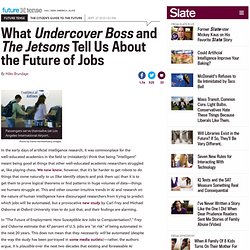
We now know, however, that it's far harder to get robots to do things that come naturally to us (like identify objects and pick them up) than it is to get them to prove logical theorems or find patterns in huge volumes of data—things we humans struggle at. 10 jobs being automated at a surprising pace. There's no question that many of the world's routine tasks are now being subjected to automation, either through robots or software.
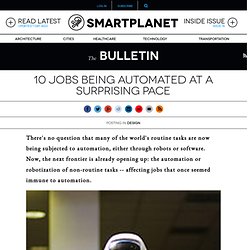
Now, the next frontier is already opening up: the automation or robotization of non-routine tasks -- affecting jobs that once seemed immune to automation. “The next frontier for automation is non-routine work," Matt Beane, researcher at MIT’s Sloan School of Management, pointed out in a recent interview in VentureBeat. "Most automation will be intangible. Once you have got good [artificial intelligence], it’s replicable at almost zero cost.” Many jobs and skills that just a few years ago seemed rock-solid are now candidates for robotization and automation. Another job being automated at a surprising pace: the boss.
The other day, we posted a list of 10 jobs being automated at a surprising pace.
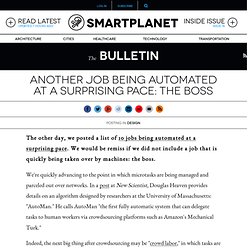
Tomorrow’s workforce will come from the cloud, study predicts. There are more outsiders and fewer insiders doing the jobs of today's organizations.
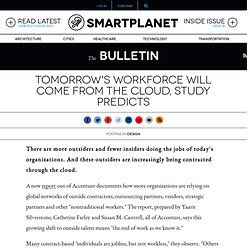
And these outsiders are increasingly being contracted through the cloud. A new report out of Accenture documents how more organizations are relying on global networks of outside contractors, outsourcing partners, vendors, strategic partners and other "nontraditional workers. " Labour markets: On "bullshit jobs" Will machines talk us out of jobs? The good news is the digital economy is creating more wealth for less work.
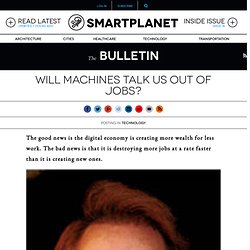
The bad news is that it is destroying more jobs at a rate faster than it is creating new ones. That's the view of Erik Brynjolfsson, MIT professor, co-author of Race Against the Machine, and a leading voice on technology-driven productivity, speaking in a recent interview with McKinsey & Company. In times gone by, Brynjolfsson says, new technologies would wipe out jobs, but in the process, create many more new types of jobs.
Prepare to 'monetize' your skill set. Half of all baby boomers intend to keep working past age 65. The rise of people acting like businesses. Earlier this year, NFL running back Arian Foster was planning on selling shares of himself.
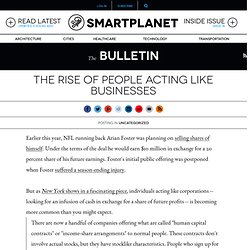
Under the terms of the deal he would earn $10 million in exchange for a 20 percent share of his future earnings. Foster's initial public offering was postponed when Foster suffered a season-ending injury. But as New York shows in a fascinating piece, individuals acting like corporations -- looking for an infusion of cash in exchange for a share of future profits -- is becoming more common than you might expect. There are now a handful of companies offering what are called "human capital contracts" or "income-share arrangements" to normal people. Why cash bonuses make people work harder than raises.
How can you get the most out of your employees? According to new research from Harvard University, it's cash bonuses or unexpected cash gifts, not above-market salaries, that motivate people to work harder. The field research consisted of 266 people, split into three groups, who were hired using oDesk.com, a website that allows you to recruit freelancers from around the world. The first group was offered $3 per hour. The second group was offered $4 per hour. What’s really wrong with Canada’s job market? Behind the headline that is our national unemployment rate — 7.1% at last count, according to Statistics Canada — is a remarkable story about something called job quality. To understand the labour market, it is necessary to measure more than just how many people are working. We need to look at what those jobs pay, whether they’re full- or part-time roles and who is writing the paycheques.
A report published by CIBC World Markets on Monday says that on those measures, the country is moving sideways at best. The CIBC Employment Quality Index is down more than 14% from the high it reached in the late 1980s, according to the report. Benjamin Tal, deputy chief economist with the firm, writes that “lower-quality employment means that, on average, we have to generate more jobs to maintain the same pace of income growth.” The next great inventor will likely take music lessons as a kid. Those piano lessons might not turn your kid into the next Rachmaninov, but they are still likely to pay off later in life. New research from Michigan State University shows that children who participated in arts and crafts activities as children were more likely to generate patents and businesses when they grew up. The study, published in the latest Economic Development Quarterly, looked at MSU graduate students who majored in science, technology, engineering or mathematics from 1990-1995.
Of that group, those students who went on to own their own businesses or patents had eight times more exposure to the arts in childhood (up to 14 years old) than the average person. The type of art training also seemed to make a difference in the impact later in life. Is Higher Income Inequality Associated with Lower Intergenerational Mobility? A lot of our political debate boils down to questions about equality of outcomes versus equality of opportunity. But it turns out that they’re pretty closely related. Take a look at the chart below, which is from a terrific recent speech (with charts!) By Alan Krueger: The horizontal axis shows the Gini coefficient, which is a summary of the degree of income inequality for each country. Asian Century Institute - Reinventing trade unions. 08 September 2013. Are unemployment numbers missing the big story - the freelance economy? The official government monthly unemployment numbers released in the United States continue to document a great mystery that no one yet have satisfactorily explained -- despite population growth, the size of the overall workforce has been stagnant.
The Real Reason Creative Workers Are Good for the Economy - Richard Florida. Global Consumer Trends - Individualism. International Markets Bureau MARKET ANALYSIS REPORT | OCTOBER 2010 Global Analysis These reports cover a wide variety of subjects and countries of interest to the sector. New reports will be posted regularly. If you wish to be on e-mail distribution in order to receive the reports more quickly, or to comment on any of the reports, please contact infoservice@agr.gc.ca. The Explosive Rise in Individualism (John Stewart)
“No Such Thing as Society”?: The Rise of Individualism and the Weakening of Social Cohesion · Sigma Scan. What Our Words Tell Us: David Brooks on the Rise of the Individual. THE NEW GENERATION. Gen Y job-hopping costs firms up to $25,000 per employee. A new survey suggests that the job-hopping Generation Y are costing businesses thousands of dollars every time they decide to broaden their horizons. Automakers turn to augmented reality to combat falling showroom visits. As people turn to the Internet to make purchase decisions rather than visit a showroom, how can car manufacturers sell their vehicles effectively? Investing in the Future of Robotics. Robots at Work: Toward a Smarter Factory. Hard at Work in the Jobless Future. Full employment and the global development agenda: going beyond lip service. Building a smarter city? Think about the business model first.
5 million jobs will go unfilled by 2020, report predicts. Sleep-deprived workers cost companies $63.2 billion each year. Ten tech skills you must have for a $100k salary. U.K. government plans intellectual property crimes department. The Four-Year Career. The Future Of Work. The Future of Work: What It Means for Individuals, Businesses, Markets and Governments. The Future of Work. Brave new work: Making the 9-5 somewhere you want to be.